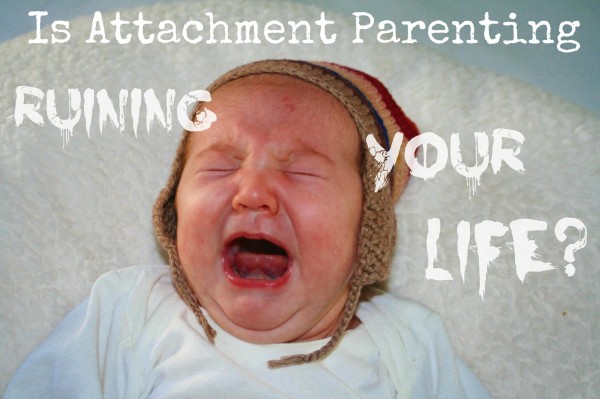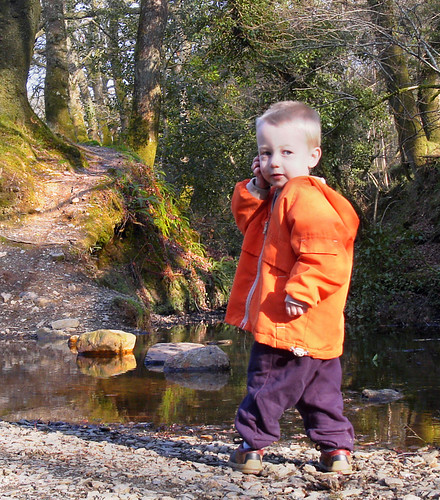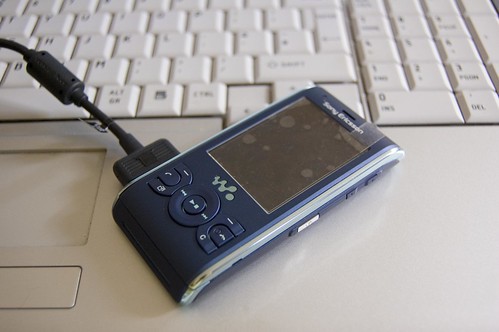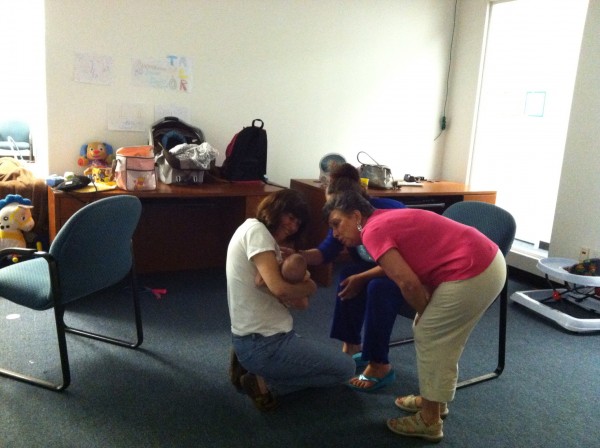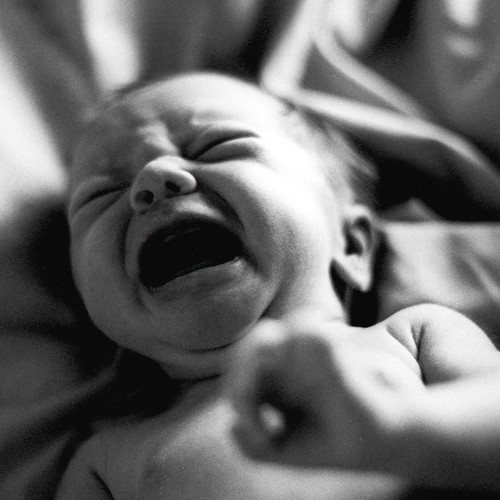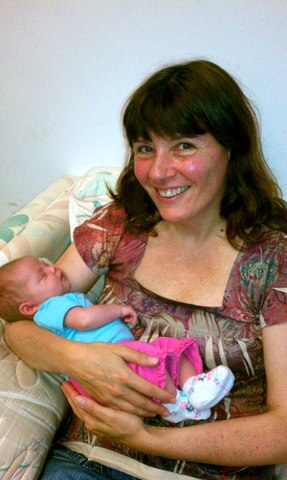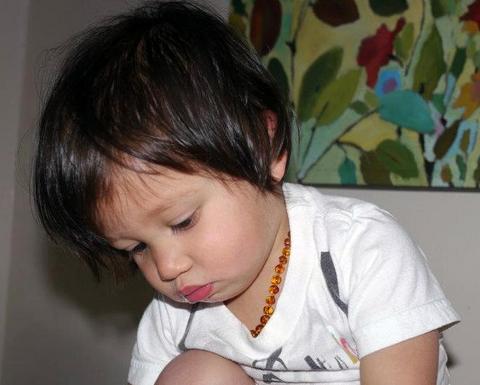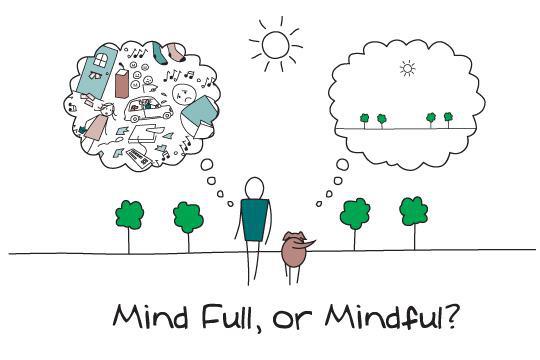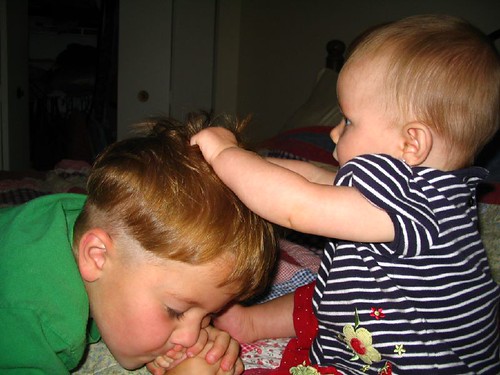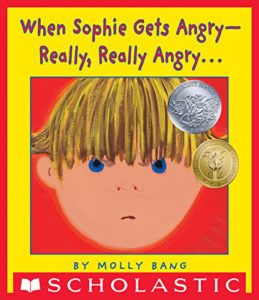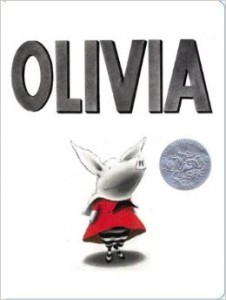Note: On November 19, 2012, I shared a link on my Facebook page, which resulted in a rich conversation exploring Attachment Parenting and other alternatives (specifically, the RIE Approach developed by Magda Gerber) that parents and caregivers might choose to care for their babies and young children. Four days later, the original post continued to generate interest and comments, with over 1,781 views, 596 engaged users, 83 comments, 42 likes, and 3 shares. Obviously, this post has tapped into something deeply important to many, which is why I felt it would be worthwhile to transcribe it here.
Lisa Sunbury, Regarding Baby: There’s more than one good way to nurture a baby. I’m sure this is going to be controversial, but please read with an open mind. This is one mother’s story about her experience with attachment parenting, and what led her to seek an alternative that worked better for her and her family.
“Not only had attachment parenting led me down a path to crazed sleep deprivation and chronic back pain, but I spent most of those first two years feeling guilty about my failures as a mother. After all, AP babies enjoy better behavior, development, and learning skills – but what happens when Attachment Parenting methods are a disaster?” Why We Ditched Attachment Parenting – Emily,of Holistic Squid
Sydney Steiner: There is a difference between AP and Bowlby’s Attachment theory Clare. People get confused about that I think, and I agree with you. I also agree with this article and have written a similar post about this. I have an “attached” baby who falls asleep on his own and who is rarely carried around. He also has a mother who is happy, well-rested, and not in constant back pain.
Ronda Nelson: Really, CIO (Cry It Out)? No need to read any further.
Lisa Sunbury: Ronda, If you don’t read, how can you understand- or judge?
Jessica Jarrett: Ronda Nelson, you should not judge as you were not there and do not know what it was like to be there and what CIO meant to them.
Clare Caro: I wonder, is for one person to leave another to ‘cry it out’ respectful behavior?
Lisa Sunbury: Clare, What do you think?
Jessica Jarrett: Our daughter would have none of it. She hated being worn and won’t sleep with us. She self-weaned the day before her 1st birthday. At first, I felt bad about it all but to be honest I don’t mind one bit now that I am not in the middle of the situation anymore (hindsight is amazing). We did what our baby wanted.
When our darling daughter was 6 months we had to let her cry for 29 minutes one time to get her to sleep on her own (We had a 30-minute window of crying until we would go get her.) and since then she has been wonderful at bedtime and she is now 14 months. I desperately did not want to do it but there was no choice in my mind. Up to that point, we would swaddle her and walk around for 1.5 hours in the dark while bobbing up and down and she would thrash around and it just kept getting harder and harder (almost dropped her and decided no more!). I dreaded bedtime every night and did not think that is how it was supposed to be…I wanted to love my child, not be scared of her.
We are always there for her and support her in every way so I think that we are doing our own version of AP.
Catherine Courtemanche Van Arnam: Lisa, this is great! Sometimes speaking the truth requires bravery, you continue to be a respectful, kind, and thoughtful kind of brave.
Lisa Sunbury: Catherine, Thank you…Sometimes I don’t know if it’s brave, or just crazy, but I’m committed to thoughtfully and honestly exploring and honoring all points of view…
Morgan Hyde Nahanee: Just another example of why it’s so important to do what’s best for you and your family not simply ‘follow’ one school of parenting ideals. I firmly believe we can connect with our children in so many ways. It’s hard for me to imagine only following someone else’ s path trying to get to that point.
Sydney Steiner: Love, Respect, and Disagreement: “I don’t have to agree with you to love and respect you. This is a phrase that I have been pondering lately. I find that it applies to two areas in my motherhood, my relationship to children and especially my relationship with other parents, caregivers, and friends.”
Lindsay Hennings: I have 2 children and we are AP parents in that we don’t CIO (Cry It Out). My first was easy. Rarely cried and slept through the night on his own. I didn’t do anything. He was just easygoing. The second baby is a different story. It didn’t matter what I did. At 20 months he still isn’t a good sleeper. He weaned at 6 months so his sleep issues aren’t from waking to nurse constantly. So I really think it depends on the child. Some are easygoing and others not so much. Some are great sleepers, others not so much.
(Note: The next two comments are mine, and were made in response to someone who commented, and then withdrew her comments and left the conversation.)
Renae, I had a very different read on this article. I don’t think the mother is blaming anyone or anything for her “guilt issues.” She was a new mother trying to find a gentle way of parenting, she chose attachment parenting and it didn’t work for her, so she made some modifications. Her tone throughout is respectful and honors both the positives and negatives of the experience she had. I shared because many, many parents understand attachment parenting to be and require exactly what this mother did, and they end up exhausted and feeling like failures because it’s not working for them. If you look at AP support boards the only answer ever given to a mother like this one is “Keep doing what you are doing. It will get better.” Not much comfort for a mother who is in pain, sleep-deprived, and losing her mind. I believe people need to have real help and know that there are other options when what they’re doing isn’t working. I don’t believe parents need to sacrifice their health and sanity in the name of attachment parenting or any other kind of parenting. This doesn’t help babies or parents.
Renae, I’m not big on labels either, but the reality is we have them, and there are some very marked differences in the different approaches to parenting. I liked this article for the exact reason you state. The woman doesn’t claim to be an expert, nor is she giving parenting advice- she’s simply sharing her experience and what worked and didn’t work for her. Everyone is free to take it or leave it, and decide how it might or might not apply to themselves and their own children. I think the only way any of us learns is through reading and listening to another’s experiences and then integrating what we’ve heard/read with our own experience, and doing what feels best/works best for our own situations. It’s all a learning process.
Laura Clout: She does say however that attachment parents treat all proponents of other parenting methods with unabashed scorn. Not in my experience!
Lisa Sunbury: Laura, Some do, some don’t- this was one person’s impression/experience.
Clare Caro: Laura, it’s written to be an exciting read, there is a lot of angry language in there that is bound to upset every AP parent on the range from ‘follow the book’ to ‘half pie’… it’s what makes it so exciting!
Clare Caro: Lisa, I think that there is no respect for the relationship in ‘CIO’ (Cry It Out), not one bean. I also think that parents are so clueless (to use the word Holistic Squid used) that they have no other option than to look for a book by which to parent. This story is about how a couple began with the Sears book and switched to the Ford book. Simple as that. In the meantime they remain just as clueless in my opinion because they forgot to ‘read’ their baby – they forgot to have a relationship with their baby, to tune in, to find the instincts in their mammalian brain. Here is what Dr. Emmi Pikler (the ambassador for respectful relationships with our babies) has to say on crying: Pikler, Emmi – Crying
Lisa Sunbury: Clare, Thank you SO much for sharing Emmi Pikler’s wise words here. As you may know, I am very familiar with (and a proponent of) both Pikler’s and Gerber’s teachings regarding babies and crying (and baby care, in general)! But honestly, there are problems with the term CIO (Cry It Out) and I don’t believe ANYONE is born knowing how to be a good or respectful parent. Most of us haven’t had good models. Learning to parent or care for babies well is “on-the-job training”, which is why people have so many questions and resort to books, the internet, friends, etc. when faced with questions or concerns. There is no doubt in my mind that these resources and conversations HELP families. (Even you reference a book resource to make your point clear.) I don’t fault anyone who reads, who asks questions, who tries and maybe fails and comes back to read some more, try a different way, etc. It’s all learning. Instincts alone are not enough to guide us, but I DO believe (and appreciate your point) that tuning into babies and listening to their cues is crucial and can go a long way towards making things easier for both baby and parent. BUT, this is still such a foreign concept to so many. How do you read a baby? How do you develop a relationship with a baby? These are questions many parents don’t consider or have an answer to, which, again, is why I believe it is so important for us to listen to each other, to converse, to share resources, to keep talking, and talking with each other, and listening, and listening, and listening to each other, and learning, and learning, and learning from each other.
Pennie Brownlee: Might want to ponder on empathy – reading with the Heart (in conjunction with the head and the book/s of your choice). Dr. Bruce Perry in “Why Empathy is Essential – and Endangered.” “Humankind would not have endured and cannot continue without the capacity to form rewarding, nurturing enduring relationship. We survive because we can love. And we love because we can empathize – that is, stand in another’s shoes and care about what it feels like to be there.” Which is a scientist and researcher’s way of telling it. Dr. Emmi Pikler put it thus: “What is important is that we learn what is essential. What is essential is to observe! [Her emphasis.] Get to know your child. If you really recognize what your child needs, if you feel what is causing him grief, feel what she needs, then you will respond in the right way. You will guide and bring up your child well.”
Lisa Sunbury: Yes, Pennie, a good suggestion. I’ve certainly benefited from “reading with the heart” and from considering the important role empathy plays in all relationships.
Clare Caro: It seems that, while we can get information and learn from books, we won’t actually get what is needed from a book – such as empathy. Yes, we must read and talk and learn together to get skilled up for the job BUT THEN take that knowledge and focus on the relationship, and honor the adult-infant unit. Empathy is a key ingredient to being able to do this. Another would have to be keen observation skills because you really do literally have to READ your baby, their cues, and gestures. In my opinion, the danger lies in using the ‘book’ to dictate your part of the relationship with your child – which is what has happened in the Holistic Squids story, in their case two books. And it’s so obvious that attachment and empathy never entered the equation because in a relationship where these things are present – when in a respectful, empathetic relationship you would not leave your best friend to cry it out. I am aware that stress-release crying is a part of many babies’ lives (particularly in the West), but to ‘teach’ them, how can this be a part of a respectful relationship? This is why I brought up Pikler’s words on crying. I am aware that you are familiar with the Pikler/Gerber teachings, and studied with Gerber for several years. I hope that in the passing down of information Pikler’s wisdom on crying, it has not ended up warping into saying that CIO is okay in any size or case, or indeed promoting it in any way.
Lisa Sunbury: Clare, Absolutely not. But again, I think you are being much too harsh and judgmental. This mother CLEARLY cares about her children and is trying to tune in and care sensitively for them, and she used books to inform her and make positive changes for herself and her children when she was exhausted, and in pain, and what she was doing wasn’t working for her or for her child. Beware of judging until you’ve walked a mile in another person’s shoes. Regarding crying… if we are responding to an individual within the context of a relationship, the response changes depending on a whole host of factors, including why the crying is occurring, and what is needed and necessary in the moment…One can feel and express empathy for another person, and still allow them to cry, if that’s what they need to do. Parents can’t (nor should they try to) stop crying all the time.
Pikler and Gerber both wrote and taught extensively about struggle in the context of growing and learning, and about the importance of observing closely to know when and if and how to intervene. That’s another piece of this whole discussion we haven’t touched on. Within the context of a caring relationship, there are times when the other might be struggling, and we can’t take that away from them – they’ve got to go through their own process, and the most we can do is stand by and be there with them in it. Pikler (and Gerber) said, “Observe, come to know the child, and you will know how to respond…” To me, this mother was observing that her child needed to learn to sleep, and what she was doing wasn’t helping either of them, so she had to stop doing what she was doing, which was interfering with her child’s sleep and ability to get to sleep.
Clare Caro: Mmm yes, perhaps I am judging too harshly, even reading between the lines of overly dramatic language you can tell she was having a tough time (yes, I do empathize with her). But then to advocate Gina Ford, who is pretty much the polar opposite of Pikler… wowsers. I totally agree (being a Piklerian ideas person) that crying is a whole other subject, I don’t put crying and CIO in the same basket personally… and the reason why (now risking sounding like a broken record) is because they are divided by ‘respect’. Still, interesting discussion.
Lisa Sunbury: Clare, Yes, when we begin with respect and developing the relationship as the core, that value informs all of the choices we make in terms of practice. Again- Pikler and Gerber’s unique contribution to the parenting discussion. One of the difficulties with “explaining” RIE, is that it is NOT often prescriptive. It’s an underlying philosophy that informs all of the choices we make as parents or caregivers, and Magda advocated for” Respect for all”. Magda Gerber said very little about babywearing or co-sleeping, for instance. If pushed she’d share her personal preferences, but most often she’d turn the question back to the person asking and ask them to find their own answer through listening equally to themselves and to their baby. She often said (for instance), “The question is not whether you use the highchair or don’t use the highchair. It’s more important to make a conscious choice and know WHY you use the highchair and make a choice that is the best one for YOU and your baby.”
Sian Hannagan: I guess you could call me an attachment parent though I abhor labels and everyone sits outside of a box as much as they sit within it.
The only parenting practices I abhor are the ones that have been shown to actively damage children such as circumcision, crying it out, spanking, no breastmilk whatsoever, shaming, and emotional neglect.
Anything else from babywearing, co-sleeping, breastfeeding duration, weaning choices, discipline choices (outside of the above), movement choices, etc etc are all horses for courses.
As you were.
Lisa Sunbury: Sian, I hear you and I’m with you- mostly. Re: “No breast milk whatsoever” this is NOT something that has been shown to be definitively harmful to babies, and some families literally do NOT have another choice. Re: CIO (Cry It Out), that’s a sticky wicket. It depends on many factors and the definition you are using, which is why I so intensely dislike the term. A child (of any age) who is left to cry for long periods of time without any comfort or support will most certainly be harmed. An infant needs to be responded to immediately when s/he cries. A one-year-old who has had consistent, loving, responsive parenting, and who is left to cry for a short period of time in the interest of learning to fall asleep on his/her own- to me, this is another matter entirely. The research indicates that there are no long-lasting, harmful effects, and indeed, the benefits to the child and the family may far outweigh the short-term discomfort and unhappiness of the baby.
Sleep is a learned behavior. Of course, a child is going to cry and protest (and has every right to) when they have been used to being rocked and nursed to sleep, and back to sleep, and when a parent chooses to make a change from co-sleeping to alternative sleeping arrangements. Of course a child deserves comfort and support in a situation like this, but the reality is, it is hard to unlearn and undo habits that have been learned, and some crying IS going to be a part of it. I always counsel parents to make these changes as slowly as possible and to gradually lessen their involvement in the baby’s sleep routine, but even then, it often means a period of time of listening to a child cry, while the child figures out how to put themselves to sleep…
Sian Hannagan: Lisa, I am referring to the first few days of colostrum and breastmilk. The results on denying an infant this IS definitive and is associated with SIDS, necrotizing enterocolitis, gastro issues, diarrhea, gut disturbances, reflux, and a whole host of other things. No ifs, no buts, no maybes. From then on inwards it’s a sliding scale relating to maternal choice and infant needs.
And the idea that a baby MUST cry to learn to sleep is not really addressing the issue accurately. There are other methods that can be used to encourage sleep very effectively that won’t cause stress in an infant.
Lisa Sunbury: Sian, Thanks for clarifying! It’s encouraging to me that at many maternity hospitals, mothers ARE encouraged to breastfeed at least once or twice in the first days, if at all possible. Obviously, this is preferable, but I still don’t think a child is doomed, if for some reason this can’t/doesdon’t happen. And again, I don’t think babies MUST cry in order to learn to sleep but depending on the circumstances, and what has gone before, some do, and some will and some must, and again, I don’t see this as necessarily harmful, or on par with spanking a child. There’s this concept of struggle that comes with mastery that enters the conversation. Struggle is a natural and necessary part of life, and learning, and may cause some stress in the short term, but it’s not entirely avoidable, nor is it necessarily something to be avoided at all costs. There are ways for adults to support and allow even the youngest of babies to participate in their own process and learning, without adults taking over for them. A parent isn’t necessarily practicing a damaging form of parenting by allowing their one-year-old child to struggle or cry for a short period of time in the process of sleep learning. I really like and recommend the posts Janet Lansbury – Elevating Childcare™ has written about sleep, and the guest posts written by Eileen Henry that address many of these questions regarding sleep learning and crying. Again, just another point of view. Here’s just one: Helping Babies Sleep (With Empathy And Compassion) Guest Post by Eileen Henry
Family Focus Movement: Here is a direct quote from Dr. Sears. Dr. Sears: “This is why we came up with the 7 Baby B’s [you can find these on Dr. Sears’ website]. They are tools, not rules. You take as many tools as you can with the resources you have. I can’t breastfeed but I can wear my baby more or I can respond to my baby more. I wasn’t breastfed. I was bottle-fed. I turned out okay. Also with our adopted baby, she was the first formula-fed baby but it didn’t agree with her so we had donor milk. This is an option for today’s mom. There are many ways of meeting your babies’ needs.”
Lisa Sunbury: Family Focus Movement, I appreciate your comment… Yes, Dr. Sears presents his ideas as “tools not rules”. The problem, as I see it, is that often the suggestions are interpreted as “rules”, and sometimes taken to an extreme, and parents feel like they are failing if they can’t continue to provide what Dr. Sears suggests after the first months. What might be a helpful and appropriate response for an infant, may not be for an 8 or 9-month-old baby. Nowhere in Dr. Sears’ writings can I find ANYTHING about including the baby in the equation, in the sense of respecting that babies come with some basic strengths, and the ability to self-regulate, if given the right conditions and support. Babies are learning every minute. This is what I appreciate about Magda Gerber’s RIE philosophy. She believes (as do I) that parenting well is a mutually adaptive process, and there is room for both the baby’s needs to be met, as well as the parents’ needs to be met. Babies have the ability to participate in their own process from the very beginning. They are not completely helpless, needy, dependent creatures, who need parents to perform superhuman acts in order to soothe them…
Family Focus Movement: I believe you also need to take a look at what Maria Montessori wrote in regards to what a child needs.
Lisa Sunbury: I have, thanks! And many of her ideas resonate and overlap with Pikler’s and Gerber’s – although Montessori worked with/focused primarily on children aged three and up, and Pikler and Gerber were/are unique in their focus on, and contribution to the understanding of caring for infants and toddlers…
Family Focus Movement: Actually, Montessori’s education philosophy applied to children starting from birth.
Lisa Sunbury: I do understand this. But Montessori primarily worked with/observed children aged 3-6, and developed her approach with children of this age. I’m no expert on Montessori, but I’ve read and studied her books, and did an internship at a Montessori preschool. Pikler, on the other hand, started with babies and toddlers, and that was her primary focus for all of her life. RIE Associate Deborah Greenwald wrote a thesis comparing and contrasting the two philosophies and methodologies when she was a graduate student at Pacific Oaks College. Again, there are areas of overlap, and some similar themes ( the importance of observation, respect for the child, creating an environment that allows the child to succeed, etc.) and the two inform and complement each other, but there are some differences as well. When were talking about babies and toddlers, nothing compares to, or beats Pikler and Gerber’s contributions in my mind.
Sarah Gremillion Brown: I guess I’m more of an AP than most of my friends, with encouragement from others. I agree with the blogger… 26 months after birth I have struggled with being sleep-deprived and a raging hormonal crazy not as connected to my hubby’s mother. Which is better parenting? Having a mom that feels herself and is able to have enough patience to parent a toddler or adhere to a 100% AP style? I agree, do what works for you and your family. I have learned a lesson for my next baby, whenever that may be. I will always lean toward AP, but I know how important a well-rested mommy is too.
Emma Bouzidis: Absolutely brilliant article. Resonates with everything I stand for as a parent. I firmly believe it is my responsibility to teach my children everything including the reality that they must learn to put themselves to sleep. We followed a similar sleeping routine and my lil man slept through at 7 weeks and now at 18 months will often sleep longer than 12 hours at night and has a good 2-3 hours during the day. Thank you for sharing this!
Elanne Kresser: It’s easy to idealize and be disappointed by any parenting approach. There were things I imagined my baby and parenting would be like based on having read RIE books and blogs, and I was disappointed, frustrated, wondered if I was doing it wrong, thought maybe I wasn’t as good of a mom as I’d hoped I would be, etc. I see a number of moms feeling very let down by their hopes for attachment parenting and I can understand this. I think there are many ideas within an AP approach to parenting that are admirable and have contributed to more gentle parenting. And I think when we stick to anything out of our ideals rather than responding to the reality in front of us we are setting ourselves up for hardship.
Lisa Sunbury: Elanne , Yes! THIS: ” I think when we stick to anything out of our ideals rather than responding to the reality in front of us we are setting ourselves up for hardship.” Although- I think living out of our VALUES, combined with looking at the reality in front of us while keeping an open mind, and continuing to listen and learn, can be very empowering, and can lead to finding ways to honor and respect everyone involved in a situation…
Pennie Brownlee: This is an interesting discussion. There is a proverb in this country (NZ) that translates “If you are going to bow down to a mountain, let it be a lofty mountain”. Dr. Bruce Perry MD Ph.D., James W Prescott (developmental neuropsychologist and cross-cultural psychologist would qualify as ‘lofty mountains’ in my estimation.
Pennie Brownlee: How will parents know what to do? Empathy is a good place to start, and for that, one has to tune in with the heart, literally, (in conjunction with their head and whatever book/s they are referring to). Dr. Bruce Perry writes in “Born for Love: Why Empathy is Essential – and Endangered”: “Humankind would not have endured and cannot continue without the capacity to form rewarding, nurturing, and enduring relationships. We survive because we can love. And we love because we can empathize – that is stand in another’s shoes and care about what it feels like to be there.” Dr. Emmi Pikler puts it like this: ” What is important is that we learn what is essential. What is essential is to observe! [Her emphasis.] If you really recognize what your child needs, if you feel what is causing him grief, feel what she needs, then you will respond in the right way. You will guide and bring up your child well.” When the Pikler Institute was doing 24-hour residential care for babies and children (1946 – 2011) as Clare Caro stated at the start of this conversation, the staff knew how to form secure attachments with every child even within an ‘orphanage’ setting. It would be worth pondering on her advice to parents, and beneficial to see what the pillars of bonded relationships are, the ones that cannot be dispensed with.
Ayu Saja: If what I did with my daughter 19 years ago is now known as Attachment Parenting, then I can say that I am a proud mum of a successful young woman who still continually, regularly reaches out for me for reassurance either by phone calls or email (she lives 5 hours drive away from my town). But I wouldn’t want to do what I did 18 years ago with my second daughter. I don’t want to “wear” her, breastfed her too long, nor am I prepared to share my bed with her unless necessary. My second daughter, in contrast, is a very confident, agile, and independent toddler at 20 months old, to her sister who was somewhat timid and well… too attached to me for my liking…
I guess each to their own. I wouldn’t want to change the way I parented my 1st daughter, though I learned a lot from that time.
Thanks for sharing the article.
Deliberate Parenting: I think any and every parent that shares her story as a way of trying to help us other parents is brave. I often shy away from topics for fear of being misunderstood. Whether we agree or disagree we are hearing someone else’s story. This either confirms what I know to be true for my family or teaches me something new.
Hasti Kashfia: In my opinion that isn’t what AP is about. I didn’t wear my sons 24/7 and we slept just fine (except for when illness was an issue) and comparing two different kids with 2 different temperaments doesn’t even make sense?!?
Lisa Sunbury: Hasti, It’s true babies all have different temperaments, but it’s also true that what a parent does or doesn’t do helps shape a child. It’s a reciprocal cycle.
Carrie Chuff: This is interesting to me. The discussion here sort of answers my question that I was afraid to ask: is AP at odds with RIE, and vice versa? What I think matters most, personally, is paying attention to each specific child’s needs, and following your own motherly instincts. Personally, at least in my own case and in the cases of moms who are close to me, our instincts are usually pretty spot-on, once you finally get down to them, away from controversies and what you grow up thinking you’re “supposed” to do. Personally, I consider myself an enthusiastic attachment parent, using what fits our family and not worrying about fitting the label. I’ve also benefited from many RIE principles. Using both (with varying degrees) has just felt right. So far in my parenting, they have meshed nicely. Apparently, however, that is not a usual occurrence?
Jennifer Hoitsma Mallios: I agree with Carrie! I take some of both. I don’t think that AP and RIE are at odds at all – unless you really want to be labeled as one or the other. Thanks for posting the article, Lisa.
Jennifer Hoitsma Mallios: I like wearing my kids, but not to the point of severe back pain. And I don’t wear them just to wear them, even when they’re crying! The baby carrier is a useful tool, but again, not something that everyone has to use religiously.
Kate Friend: Both of my babies HATED being worn! Wonder what the AP reading of that situation would be! They wanted to explore and wiggle and definitely not be stuck with all my body heat on them. And both times I hoped and expected to wear them all the time because nothing’s sweeter than having that little one snuggled up against you and still having your hands free to drink your coffee and Tweet. (Go ahead, judge away.)
Clare Caro: You drink coffee? te he just joking.
Trish Collins: I see stories like this and I wonder why people are so averse to following their gut when it comes to parenting. I follow many AP principles, but I stopped wearing my son around 5-6 months old because he was 24 pounds and it was too heavy. I occasionally wore him after that, but I didn’t think of myself as a failure for not wearing him all the time. Wearing him had stopped working for us and I didn’t worry about it. Like the previous commenter, Hasti says, you can’t compare two different kids who have two different temperaments. Is it Dr. Sears’ job to spell out exactly when to stop doing something? Aren’t we all adults here? I think the conversation should move away from labels of parenting and instead encourage parents to follow their gut, which will likely mean a different method of parenting with different kids, even in the same families.
Penelope Wincer: An interesting discussion. I think the problem is following any particular parenting style to the letter. I’ve found both attachment parenting and RIE so helpful and apply lots of techniques from both styles and don’t find them at odds at all. In their hearts is respect for the baby. I use ideas that suit my babies and my family. I don’t co-sleep any longer but I am responsive at night. I babywear but my daughter is left to play for long periods uninterrupted. I think reading these ideas has enhanced the tools I use as a parent and has a very positive effect. But no one should follow a set of rules to the point of going against their baby’s needs! Or their own needs. I’m wary of when people say you should just follow your instincts though too – instincts are often the result of the way we were parented (good or bad) as well as the culture surrounding us. So there is no harm in challenging your instincts by doing some reading – just maybe don’t abandon them entirely.
Danielle Dixon: Well said, Penelope 🙂
Trish Collins: I agree 100% with what you said, Penelope. I just want to clarify something. What I meant about following your instincts is that if something isn’t working, there’s no reason to continue doing that for weeks, months, or years, no matter what the “style” is or what the perceived benefits of that style is. I mean, when someone complains to me about their child’s sleep issues, my first question is what is acceptable to the parent. If co-sleeping isn’t working for them, I wouldn’t encourage them to continue doing it even though that’s what’s working for us. The article was surprising to me because the author continued doing something long after it stopped working. That’s what I mean about following our instincts.
Claire Larroux: In the Continuum Concept “philosophy”, which is similar to AP, babywearing is for the first few months of the dependent stage and then at the exploratory phase the baby is left to explore – a bit like an RIE baby. I think that makes total sense…
Toni Durbano: While wearing your baby may not be for everyone, there is absolutely a way to wear even 40 lb preschoolers and bigger children in a pain-free manner, given proper technique and appropriate carriers. I don’t find the article so judgmental (and I’m an AP parent who co-sleeps, nurses, and wears my baby) because I think all she’s saying is a certain parenting style didn’t work for her. I do wish she considered the idea of balance that Sears talks about and acknowledged in her article that he and others who promote extended breastfeeding and other tenants of AP address the idea that if parents are struggling/resentful they need to re-examine how they are applying AP and make a change. There is nothing in this parenting philosophy that demands parents sacrifice to the point of misery or physical pain in order to patent this way. Had she discussed this idea I would’ve felt she was being honest and informative about her AP experience rather than inflammatory.
Carrie Chuff: Penelope, I respectfully disagree a bit regarding instincts. I absolutely agree that research and reading is a good and necessary thing, because knowledge is power and it’s always good to challenge yourself to seek the truth in all things, not just parenting. But I really do believe all human mothers, regardless of their culture or upbringing, have innate knowledge in how to best care for their children. I think culture and upbringing have a lot to do with how a person later decides to parent, even subconsciously, but I don’t consider those instincts. I think a mom knows in her deepest self if a parenting decision is or isn’t right, though it may take uncommon self-knowledge in order to know it and listen to it, apart from what she’s learned or been told by her culture. That’s why listening to one’s instincts, in my opinion, should actually spur them on to learn more, rather than preventing them from challenging their preconceived notions about parenting. Maybe that’s just my own temperament, though.
Victoria Byres: I love so many aspects of the RIE approach but I feel that promoting articles like this is divisive. Obviously, there are plenty of happy and thriving A.P. parents and babies so I would much rather read about what is working well for families that follow RIE than how one lady misinterpreted AP.
Lisa Sunbury: Victoria, Thanks for sharing your point of view, but I didn’t post the article to be divisive or to promote one parenting style over another. I wanted to begin a discussion and hear from people about their experiences. The overall question for me is not “AP vs. RIE parenting?” but, “What has your experience as a parent been? What tools have you found to help you and your child, and which have worked well or less well? What did you do if you run into difficulties? What are good ways to meet a baby’s needs AND to meet your own?” I think we all learn and grow from listening to and considering other points of view. And the reality is, AP (and RIE, for that matter) are BOTH often misinterpreted. I continue to be committed to more understanding all around.
Angela Hill: There is nothing at all wrong with letting a child cry. But for the life of me, I will never understand why parents think it is a good idea to leave a crying baby/child alone. You don’t have to bounce, jiggle, carry and booby the pain/discomfort/feelings away and you don’t have to walk away. There is middle ground. It is called listening. It is called relationship. Put the books down and have a relationship with this little human balancing their needs with yours to the extent that you can.
Lisa Sunbury: Angela, I tend to agree with you, but I’m going to play devil’s advocate here for a minute. I’m going to use this mother’s post as an example. I’m NOT talking about an infant here. Child is a year old. Mother and child are both exhausted. Sleep rhythm is disturbed or non existent.Child hasn’t had a lot of experience learning to fall asleep on his own. Mother decides to make some changes. She’s prepared her child, she’s given loving, responsive care , and gone through the bedtime routine, and now it’s time to leave the room, turn out the light, and let the baby sleep. Baby cries. This is new, uncomfortable, he doesn’t like it, he (rightfully) wants what he has grown accustomed to, which is holding, co-sleeping, nursing, bouncing. Mom could go in and comfort- BUT, is that really the most helpful or respectful thing in this case? Might that not just upset the child further, and/or interrupt the child’s process further? Might the message the child receives be, “I am here, but I am not here?” Might the child experience confusion about why his parent is there but refuses to respond in the way he has known her to for all of his life? Isn’t this more cruel than just allowing the crying and allowing the child to work through it and go to sleep on his own? Might it not be a case of pulling the band aid off slowly vs. quickly and cleanly?
I absolutely don’t believe that a child who has loving, responsive care is going to be harmed, or feel “abandoned” in a case like this. Now, if the crying went on for more than half an hour, or the child woke in the night crying, or it had been a week, and the child still cried just as hard and as long at bedtime, of course this might require a different response. Again, it depends on a parent listening to, and knowing their child, and themselves. (And just for the record, because I know I’m going to take heat for this point of view, I DO NOT advocate CIO. I often counsel parents on sleep issues, and I tend to advocate a slow, supportive approach to making changes, and I personally have never been able to listen to a baby cry for more than 5 minutes without going to them, but I have also personally known, and worked with parents who have chosen to take exactly the approach this mother did, and their children are thriving, healthy (emotionally and physically), firmly attached, and well rested…)
With lots of discussion (with her) and preparation, we allowed her to settle herself during the early evening. She cried some the first night, less the second night, and by the third night she was sleeping solidly for the first 5 hours of the night (after which I would bring her to bed with me at her first waking).
I received a lot of grief on a couple of AP pages when I attempted to discuss this (Actually, I was banned from one page.) but I feel 100% confident that what we did was far MORE respectful and responsive to my daughter than continuing with our old routine. She was not happy, and she was not sleeping well. Now she is able to sleep for large chunks of time on her own, and the fact that she adjusted so quickly tells me that she was ready for the switch.
In addition, not inconsequentially, it is very helpful to me to have time in the evenings where I’m not always waiting for her next wake-up.
To Clare and any others who are of like mind… I don’t think that parenting fundamentalism is helpful to anyone. It may make you feel more secure to believe there is “one true way” to raise children, but it just isn’t so. My daughter and I are very attached, and I did what was appropriate to support her independence and her development.
Lisa Sunbury: Sundari, I sincerely appreciate you sharing your experience here.
Maureen McLaughlin: That was an interesting read, for sure. I think she opens a bit dramatically with some of her word choices about AP ‘ruining her life,’ and being ‘smacked on the wrists,’ by AP parenting advocates but softens her rhetoric by the end of the piece. Which is good because her whole point is we need to stop being so judgmental of one another.I definitely related to much of what she said because she is describing almost to a T the experience we had with our first (he is now 23!). At 9 mos. my friends did an “intervention” on me because I had not slept for more than 15 or 45 min. in a row since he was born! For the exact same reasons: he had absolutely no idea how to self-soothe. There weren’t a lot of “methods” out there at the time so we used the Ferber method to get him off the night wakings/nursings.
I think my one area where I disagree is that I don’t think anything should be done, if possible, until at least 3 months of age. Hopefully sometime between 3 months and when they begin to stand. It took our son 6 nights of sleep “training” to get it including throwing up his breast milk because he would get himself worked into such a frenzy. I would cry too, but I liked the “plan” that I could go in a check on him in intervals…so I just tried to make it interval to interval. After 6 nights, it truly did transform our lives. Our son began to take naps, I started getting about 6 straight hours, I could plan our days better, etc. I think there is definitely a balance between the CIO method and the AP method, and I guess we all have different constitutions and personalities. I could not be a human pacifier and a happy person too.
I could not “babywear” because my babies hated it and I have also have back problems. I either held them with my bare hands or set them down. When I set them down I included them in on whatever I was doing. (Up on counter in baby seat watching me chop veggies, etc.). I weaned all of mine around 1 year. It was never traumatic because I had been working towards it with baby steps.
Lastly, I did co-sleep with my newborns in the crook of my arm…My 2nd one was a champion who only ever needed to be nursed once a night. Spent the first half of night in his own crib, 2nd in a double bed with me in his nursery. Third was high need in terms of snuggling. Did family bed with her, but she transitioned to the bottle around 10 mos. and merrily sucked on it till she was 4 (only at sleep times). Ack, I’m sure I will catch a ton of flack for that, LOL 😉 She was also a thumb sucker, so we did not mind sleeping with her. For me, I think it was the combo all night nursing plus co-sleeping that I couldn’t manage past 3-6 months without turning into a raging zombie. Namaste! Great discussion.
Stephanie Ann Peterson: As far as sleeping, I just feel the Hand in Hand approach is the most respectful. Staylistening communicates the most empathy to me. I think we should stay even if it takes longer and appears to cause more crying and/or raging. I save the walking away for when I am going to lose my patience and need to collect myself. That being said I don’t think walking away from a year old baby will necessarily damage them…it is just not best practice according to my heart. What I like about AP is that is really honors our biology and the story of a babies evolutionary needs. It honors closeness and empathy. I like RIE because it is about mutual respect and boundaries…which also promote empathy. I have both philosophies in my toolbox. There are times where I need to bend a little to meet my daughters needs and there are times to set her up for success to make changes and bring balance and peace to the family. I always trust that we can meet halfway. I am also a very big fan of James Prescott as mentioned above. Very interesting research regarding parenting practices in relation to violence and suicide.
Kathryn Estay: Where is the Dad in all this?
Lisa Sunbury: Kathryn, Good question!
Maureen McLaughlin: Yes, Kathryn- LIKE very much! In our family, after the first year Daddy was on duty for any night issues! But I had three kids…Got pregnant with each subsequent one when the other was age 2. So 9 mos. of pregnancy, one year of nursing, one year of getting body ready to conceive again. I needed some rest in between.Again, there may be some who would say I am a horrible parent for not tandem nursing, not nursing while pregnant, etc. But my body — my constitution — was just not able to do it. I think it’s fine when women can w/o losing their minds. I have no issues with child-led weaning, etc. I just wasn’t able to manage that and still be a happy, healthy person and “good Mama” with the necessary patience when I was that sleep deprived!
Lisa Sunbury: Maureen, I don’t think you’re a horrible parent at all!
Carrie Chuff : Kathryn, I think the focus is more on the mom because, especially for young children, she is, generally, the primary caregiver. Usually we assume Dad is on board regarding parenting philosophies/styles/techniques, etc. (because if he’s not, that aspect is often brought up right away). Dad’s role is very important, too, but Mom is the one closest to her children at this point in their development, if only because she’s the one who is (usually) spending the most time with them.
Kathryn Estay: Yes, but my question is, where is the Dad when the parenting is done? Do you let your Child do whatever they want because they are young and don’t know what they are feeling? You are training your Child to act or not act a certain way whether you do it on purpose or not…It’s habit building….I think We as Mothers have a very important job, and yes we are around the child the most. I do think that my Motherly instinct gets in the way at times of the well being of my Child..It’s feelings. Emotions. That’s not always right…..The world has a mentality of “if it FEELS good do it” And you see where that has got us….I feel horrible listening to my Child cry in her bed, My instinct is to pick her up….But that is training my Child to cry for everything She wants. She understands I will wait until She stops, then she gets picked up right away……
Megan Haroldson: I always like having a bag of tricks and adjusting to your life style and children. We do everything: babywear/strollers, cosleep/cribs, etc. I do feel like an AP failure because I have 3 kids, 5 and under which is a lot of attachment. I can’t imagine not baby wearing- but I have a 23lb 6 month old so she is put down more often that if she were 15lbs. …I do encourage daddy-attachment and he is as close to our children as I am which is a major blessing.
Kathryn Estay: I think you misunderstood me, and it’s my fault. My comment about the crying in bed applies to my 1 year old…Not a newborn! And guess what- my 1 year old will stop crying when I walk in the room.. “When the parenting is done” refers setting boundaries and to the times when you are trying to teach a Child a lesson/training/disciplining a child. We are not restraining the Child’s emotions, We are training them to control them. But this wasn’t my question. Where is your Husband in the parenting process? Most Fathers are on the side lines, not really taking part. The Husband is the spiritual head of the Home. He is the one that sets boundaries, and leads the family. We as women can get caught in our emotions and be blinded, I know I do. And He is the one who keeps Me focused.
Kathryn Estay: Carrie, I’m not trying to argue or say anything negative about any parenting style. If anything is done out love it will work. But the motive has to be right. Spanking will work if done out of love, not out of anger. If the motive is wrong, the parenting will not work….And yes Parenting is an ongoing process, it never ends. I’m curious Carrie, When your son is told to do something and disobeys you. What do you do? Cause I don’t get a clear definition reading the “grace” parenting…..Or if your Son hits you or your Daughter? What do you do?
Carrie Chuff: Sorry, I didn’t want for it to become or be perceived as an argument, which is why I deleted my comment. It was also a little off topic anyway, haha! Regarding discipline, I follow the advice of Dr. Laura Markham – it has been well-suited to our needs.
Images of Learning Project: Thanks for sharing this article Lisa. This parent was very brave to share their viewpoint. As Meredith Small says, parenting is the one part of the human experience that everyone has an opinion on and they aren’t afraid to share it. When we label ourselves we don’t leave room for other possibilities.
Maureen McLaughlin: Kathryn Estay, ‘Spanking will work if done out of love?’ What? Lisa Sunbury can you help here?
Lisa Sunbury: Maureen, Spanking may “work” in the short term, to scare children into temporary obedience, but it erodes the relationship of trust, and there is nothing “loving” about spanking. I don’t believe hitting someone smaller and defenseless can ever be said to be loving or respectful. I’ve written about this here: It IS Possible To Discipline Children Effectively Without Shame- A Very Personal Post. I also especially appreciate Kim’s reflections (The Single Crunch) on the topic of spanking: I Used To Hit My Children.
Maureen McLaughlin: I’m going to read both of those soon, Lisa. Thank you. In my opinion, spanking parents aren’t using ANY of the tools/techniques/philosophies we discuss on yours, Janet’s and other’s pages. I just wish spanking parents knew that babies and kids grow up, and someday they may find themselves with a violent teen who will turn to their parent (s) and make sure they know *exactly* where they learned it from. Please don’t spank.
Lisa Sunbury: Maureen, I fully believe that when people know better, they do better. Again, we just have to keep listening and talking, coming from a place of love, turning people back to look at themselves and their children, and building on any little strength. With spanking- it’s a vicious cycle. People who were spanked growing up often don’t know any better.
Leyla Momeny: Thank your for sharing! One of the most important nuggets that I learned during the RIE Foundations course is that babies deserve a shot a life – at being a being in the world! To go from the womb to 24/7 “babywearing” (probably one of the lamest terms in the universe!) doesn’t give them a chance–a shot–to be a human in the world, in space, on the floor, on their own terms. Liz Memel spoke of it with the language of being provided with the time/space to “organize” their bodies and to continue to gain knowledge of themselves and their bodies in space. I think these ideas are so hard, and sometimes so painful, for AP-adopters to honestly and openly consider.
Leyla Momeny: I hope it wasn’t too harsh to poke fun at that term. The idea is that I can wear a pair of earrings. I can wear a scarf. I can wear a jacket, but good lord, should I be defining myself as someone who WEARS a human being? eh. The distinction between “baby-carrying” and “babywearing” might seem insignificant to some, but the language invokes the type of respect that we do (or don’t) have for babies/toddlers. And this matters.
Lisa Sunbury: Leyla, Exactly! Beautifully said!
Maureen McLaughlin: OK, so this is getting good. We are touching on something I can really relate to. First of all, when I “wore” my babies turned in they thought they were supposed to nurse. I know there are Moms out there who wear and nurse at the same time…But I wasn’t comfortable doing that. I wanted to just sit down and focus on nursing. Not nurse and make dinner, nurse and vacuum. For me, it wasn’t about ways to increase my abilities to multi-task. When my kids were older (about 6 mos and up) I did enjoy wearing them in those backpacks for hikes, but then with my third I herniated my disc doing that and that was the end of that ;)Leyla, I also gave my kids some “free time” in (horrors) a play pen that had a few beautiful things hanging on the sides for them to look at and perhaps a couple of toys and a sheepskin to make it nice and cozy (I know now they don’t want parents putting babies on sheepskins, so please don’t). They enjoyed rolling around and stretching, etc. I would just bring it in the kitchen so they were near me. I hope these ideas are helpful for parents, who, like me just weren’t comfortable with the “baby wearing” model. I’m glad it works for some parents…It just didn’t for me (us). I definitely think I was a baby-carrier. I got comfortable holding them on my hip for many household activities so they could watch what “we” were doing.
Lisa Sunbury: No matter the “style” of parenting or caregiving we choose- we all share one thing in common: We are all dedicated to learning about, practicing, and promoting gentle, respectful ways to care for and parent our babies, and to support other families in doing the same, as is so beautifully expressed in this note to me from Kim of The Single Crunch:
Last night Janet Lansbury – Elevating Childcare™ mentioned in a status that there was a great conversation going on here. I followed and read the thread (not yet the article) and learned SO much from your words. Thank you. I tend to do as you said and when a parent posts on my page, sometimes instead of thinking of what’s best for the family I think of what is most “AP”. I am sorry for having done that. Those are not the answers I would have wanted when I was still very new at this, or the answers I’d want now. Though I do believe that “what is best for the child is not always what is most convenient for the parent” (can’t remember who to quote but it’s someone else, not me lol); I also believe that parents can find what works for them and still takes into account the needs of their children and family. You helped me to remember that my goal is to help parents parent intentionally and with unconditional love…not simply to parent by the AP model. It is a fantastic model and one that, due to my circumstances, fits my life very well. I have to remember that circumstances, resources, knowledge, and access differ. You made so much sense, you explained yourself so well and very gently, and you stood up for children and for parents simultaneously. A mom asked a question this morning about co-sleeping and I immediately thought of your words and I was able to pause and to reflect on all that may be going on for her, and to answer her in a way that I felt showed I care for her child and for her. Parents can handle a lot more than children can but we are still people, too; and we have to keep our cups full before we can fill anyone else’s. Thank you. Love.
